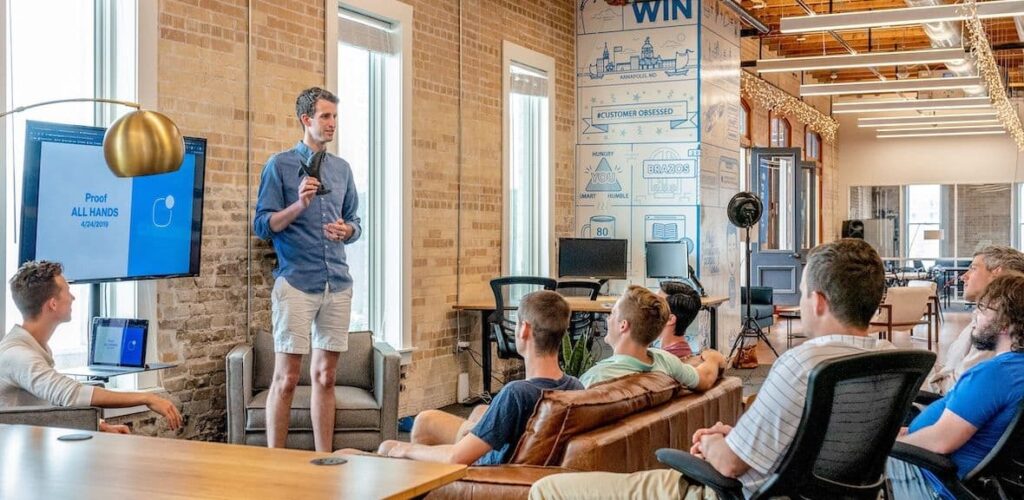Friday Coding Sessions – How we Learn from Each Other
Friday Coding Sessions are one of our main in-house developer educations. Inspired by skill exchange communities, we gather every Friday.

Overview
- Point Jupiter had challenges attracting the best people when we just started
- To become more attractive, we envisioned a comprehensive education program
- It works for everyone, and it especially empowers our junior developers
- Being a college dropout is not a guarantee you’ll end up being Bill Gates or Steve Jobs 🙂
- We offer 4 hours of paid education every week to all employees
- Offering education to potential hires can be a deciding factor for them to join you
Friday Coding Sessions – becoming more attractive
Our Friday Coding Sessions (FCS) are one of our primary education and growth activities. When we were starting our company (Vibor, our CEO wrote about this in his post), we were unknown. Challenges of finding and growing the best people in our industry were on our daily menu.
We knew that a competitive financial package is essential. We also knew that money is not the only important part of our people development strategy. During hiring interviews, we discussed development wishes with potential hires. We didn’t stop there. For one of our team gatherings, we went to the Croatian island of Vis. Our mission? To discover how we can be more attractive as an employer! We wanted to include the entire team – designers, developers, PMs, QAs, and executives.

One of the ideas surfacing through all our conversations was education. People in our industry are looking for chances to grow. They are looking to learn, and to become the best versions of themselves, they can be. Some people might not find that very motivating for them – we choose not to hire those people. We are looking for creative, agile, and even playful people. People who enjoy exploring the unknown. We are searching for people motivated by the prospects of stretching their horizons.
FCS inception
With all this in mind, we envisioned our comprehensive 4-hours-a-week paid education. One that would involve all our full-time employees. This means that you can use those four hours to learn about anything you want during your regular work time. You can use that time to learn on your own. Or you can join an online course. Or, simply enter some of our in-house education and skill-sharing workshops.
For now, we have two major teams who created their educational programs. Developers have their Friday Coding Sessions (FCS). Our designers have their Design Review/Critique meets.
As Point Jupiter’s CTO, I will discuss our FCS. My colleague Hrvoje will share his experiences during the Design Reviews/Critique meetings.
How do Friday Coding Sessions work in real-life?
Every Friday afternoon, after our lunch, the entire dev team gathers in our attic. People present their work efforts and accomplishments made since the last week’s FCS. We are working on an internal project. As a team, we envisioned a project that will enable us to log in our hours using a variety of different interfaces. At the moment we will do that via the Productive API. Productive is a time-tracking and agency business management app we use.
We have a mini-team working on a web interface. There is a team working on a command-line application, and people working on a PWA and cross-platform app(s). Others are exploring web browser extensions.
We wanted to explore different aspects of development. While we are using Productive API, we want to build a product-agnostic solution. This is a process of crafting a simple and extensible architecture. One that will be able to tie with other third-party APIs.
We don’t see this as something we will release on the market. Yet, it’s interesting enough and covers a lot of ground for us as a team to go around and explore. Therefore, it also provides us with a particular tech and interface variety. It is something that is not always present within a (smaller) single project for a client.
FCS offers us a unique opportunity to assess different approaches and technologies. It also works with our junior developers. They get to work and learn side-by-side from our senior engineers. We also foster a culture of openness and mutual encouragement. We review our code, offer insights, test, deploy, explore – learn, and improve.
Inspired by skill exchange communities
Friday Coding Sessions is not our invention or innovation. The idea or principle of skills exchange has its roots in the early days of the IT/tech community. Multimedia institute in Croatia/ MaMa started organizing skills exchanges for the tech community. MaMa started those activities back in 2005, alongside their Hacklab. What began as a simple, regular, once-a-week gathering, turned into a full-blown program. Tech enthusiasts attended the program. People interested in discussing social aspects of digital and networking technologies found their place there, as well… It was a stimulating environment. One where complete novices could learn from experts and then share their skills. It was free and based on each person’s merits.

We embraced that spirit and built upon it. It is exciting and astonishing, at the same time, to see us all grow as a team. It is also inspiring to see every one of us grow as a professional and a developer. The ethos of knowledge sharing and taking pride in being able to contribute is part of our DNA. The ability to (re)deliver knowledge to your colleagues is a very exhilarating experience.
Empowering junior developers. And everyone else.
Working with junior devs, we noticed that some of them will be shy to ask their mentors questions. I can say that we encourage and even reward open communication. Our hierarchy structure is flat. Yet, some of our junior developers are still somewhat reluctant to ask questions. During our education and training sessions, we are reviewing their work. We are helping them with their exact problems. That way, we can be more efficient – sometimes, all they need is a nudge in the right direction, and the rest will follow.
FCS plays a vital role in those efforts. It also helps develop strong professional bonds. Therefore, it is lowering the potential barriers when it comes to asking questions.
Our FCS is our most popular in-house education and skill exchange program. But, we also encourage people to use their 4-hours-a-week paid training beyond FCS. Some people take courses on Udemy, Freecodecamp, Coursera, and elsewhere. If we need to pay for some courses – our colleagues will let us know, and Point Jupiter takes care of that. We understand and appreciate the fact that different people have different learning approaches. It’s a reasonable effort for us to try and accommodate them.
Besides these kinds of education, we send our colleagues to workshops and conferences. After they get home, safe and sound, we ask those people to redeliver and share what they learned. We can’t send the entire team at the same time to the conference on the other continent. Time constraints prevent us from sending all those people to the same conference. That is why redelivery helps us a lot.
Formal education and a university degree?
One of the often-asked questions is about the value of formal education. It’s easy to form a picture that college or high-school dropouts make for the best devs and designers. People often draw parallels between Steve Jobs and Bill Gates. Jobs and Gates are probably the most famous college dropouts.

When talking to high-school or college students – we always tell them the same thing. Having a degree and formal education doesn’t mean that you will be an excellent developer. But if we have to choose between two capable hires with the same skillset – we would hire that person with a degree. Our current team has people from various academic backgrounds. Some are with a Master’s degree and some with a Bachelor’s degree. Some haven’t (yet) completed their degrees. Having a degree will not, on its own, give you a higher salary. But, it will provide you with a substantial headstart during the hiring process.
Once we get you on board and become a member of the Point Jupiter team, you will have the chance to learn more. You will take part in our educational activities and workshops and grow your knowledge. Having a degree in computer science, physics, economics, or any other field – can only help you!
Let’s connect
If you are looking to join us and our FCS sounds interesting to you – head on to our Careers page, and apply. Degree or not – we are looking for great and talented people.
If you are a potential client, interested in hiring us, let’s talk! As you can see, we are investing in all our people and their skills. As a result, we stay on top of modern technologies and business developments. That positions us as desirable, long-term partners.
We’d love to hear from you and learn how we can contribute to your success. Check out our work and cases and learn more about the services Point Jupiter offers.